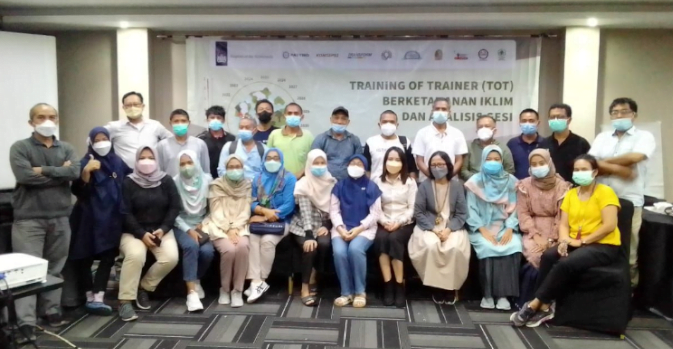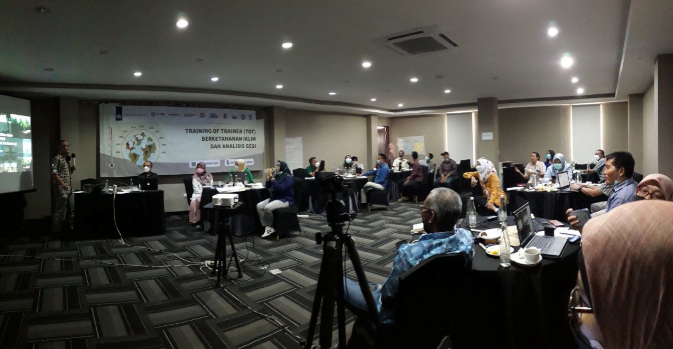
Jakarta, February 2022.
One of the outcomes to be achieved in the “Voice for Inclusiveness Climate Resilience Actions (VICRA)” program is that issues and policies of climate change can be discussed and understood by various stakeholders at the provincial, district, and village levels. To achieve this outcome, it is necessary to increase the knowledge and capacity of the program implementers, so they can educate the assisted groups and stakeholders regarding the importance of developing inclusive climate resilience actions. Following up on this, the Centre for Regional Information and Studies (PATTIRO) together with the CSOs Consortium consisting of KONSEPSI, Transform, LP2M, PKBI in West Sumatra, Mitra Bentala, Bengkel APPeK, Yayasan Ayo Indonesia, and YPPS, conducted a Training of Trainers (ToT) on Climate Resilience and Gender Equality and Social Inclusion (GESI) Analysis. This ToT was intended for program implementers in the four provinces that are part of the program area, namely West Sumatra, Lampung, West Nusa Tenggara (NTB), and East Nusa Tenggara (NTT).
This event is a part of VICRA activities supported by the Dutch Government through the Dutch Ministry of Foreign Affairs. The ToT was conducted in Bogor on 28-30 January 2022 and facilitated by Ramadhaniati (GESI Specialist in VICRA), Moh. Taqiuddin (Climate Resilience Specialist in VICRA), Agus Salim (Program Manager), and Mei Tatengkeng. The ToT was opened by the Executive Director of PATTIRO, Bejo Untung. In his opening speech, Bejo emphasized that the VICRA program and climate change should not be treated as separate issues from other programs that have been socialized to the public. Bejo explained that climate change could threaten food security, and in the long term might worsen the stunting situation in Indonesia.
“One of the impacts of climate change is the decline of food production. If high-quality food is not provided adequately, this will increase the risk of stunting in children. From this example, it can be said that VICRA and climate change issues can complement programs that are already running in the local community,” explained Bejo.
On this occasion, CSO partners revealed several challenges encountered in the field. One of the challenges faced by CSOs is that climate change is still considered an abstract concept or “up in the clouds” by the public. It is the task of the program implementers to simplify terms and concepts used in climate change, so that it can be more easily understood by the public, especially vulnerable groups. Through this ToT, participants are expected to find keywords that can be brought along when discussing climate change at the local level.

The ToT was also attended by the Deputy Director of SEAMEO BIOTROP, Perdinan. In his presentation, Perdinan explained that the objectives of climate change adaptation in Indonesia are to reduce risk, increase adaptive capacity, strengthen resilience, and reduce the vulnerability of climate change in all sectors by 2030. Furthermore, Perdinan explained the flow of developing climate change adaptation programs consisting of analyzing climate change and its impacts, identifying vulnerabilities, identifying future risks, and determining adaptation actions. Perdinan gave several recommendations for preparing climate change adaptation actions in the VICRA, including the types of action that can take the form of soft intervention, through capacity building, governance, and finance management. Then, it is important to create a list of priority actions and input real examples of climate change adaptation actions that exist in Indonesia.
“There is no need to create complicated mechanisms when designing climate change adaptation action programs in the agricultural sector; the most important thing is that these actions are directed towards three things: time, production, and consumption,” concluded Perdinan.
In this activity, CSO partners were also introduced to the concept of GESI and Gender Mainstreaming (PUG) presented by PATTIRO’s Senior Advisor, Maya Rostanty. Maya explained the urgency of GESI-based climate change adaptation actions, where the internalization of GESI in climate change adaptation is aligned with the objectives of the Sustainable Development Goals (SDGs) – development of, by and for the society, both men and women (No One Left Behind) – and national commitments related to Gender Mainstreaming. It is expected that the internalization of GESI in climate change adaptation plans can ensure equal access, participation, control and benefits between men and women, including other vulnerable groups.
Through the ToT, participants were also introduced to gender analysis tools that could be used to determine the existence of gender gaps in climate change adaptation, both in the policy aspect and its implementation in the field. From the gender analysis conducted, it was expected that participants would be able to identify gender gap issues and formulate climate change policies/programs/activities in the regional level to be more gender-responsive and inclusive.





